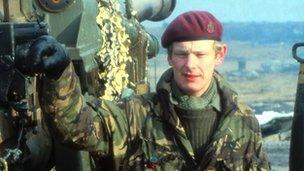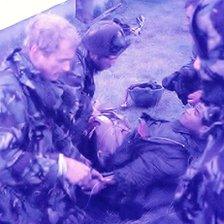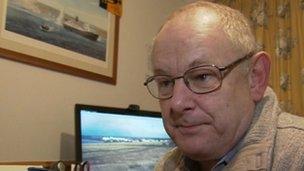Falklands anniversary: 'We treated more Argentines than Brits'
- Published

Steven Hughes joined the army while he was at medical school
On the 30th anniversary of the Battle of Goose Green, where British troops experienced fierce fighting with Argentine forces during the Falklands War, a medic recalls treating casualties.
"We probably dealt with about as twice as many Argentines as we did Brits," says Steven Hughes, then the Regimental Medical Officer with 2 Para.
"The ethics of treatment of the enemy on the battlefield you can argue back and forth but under the Geneva Convention and the principles of Hippocrates you treat every individual on the merit of their wounds and not on who they are fighting for and fighting against," he says.
"Once I'd started treating casualties professionally and treating the Argentines in exactly the way of our own, then my medics started to do the same."
During the battle 17 British troops died including commanding officer Lt Col "H" Jones. Initial reports said 250 Argentine soldiers died, although the figure is now thought to have been much lower - possibly below 50.
The British troops, who were vastly outnumbered, took more than 1,000 prisoners of war and released local residents imprisoned by the Argentines.
'Amazing recovery'
For someone not long out of medical school, the injuries suffered, mostly multiple shrapnel fragments, presented a challenge - especially as gunshot wounds were a rare sight in civilian hospitals at the time.
"These were all guys who were gungy, their smocks are covered in whatever they had picked off the ground. So you've got contaminated wounds so everyone's having penicillin.
"We're trying to clean things up as best we can and put a dressing on. And then move them out as they need to be under the knife of a surgeon ideally within six hours in order to reduce the risk of subsequent infection of the wound," he says.
Mr Hughes said he was "absolutely gobsmacked" that everyone treated at the field hospital survived.

Mr Hughes believes everyone who was treated by the field hospital survived
"It is a testimony to the fitness of these young men. Not only did they survive but their recovery subsequently was amazing. The wounds they sustained and then the short period of time before they were back to almost fully fit. It was humbling really to see that."
Now an orthopaedic surgeon, Mr Hughes had joined the army as a student, "to pay my way through medical school, for a bit of excitement, give myself some time to figure out what I wanted to do once I qualified".
His battalion had originally left Portsmouth bound for a tour of Belize and Central America when they were diverted to the South Atlantic. During the journey they trained one man in ten as combat medics and every soldier in the basic principles of first aid.
Danger
They were the first troops ashore, with the exception of special forces, when they disembarked from the landing craft on 21 May.
It was "chaos", Mr Hughes said. "We'd spent the best part of two weeks making sure the boots were waterproof and went into water that was thigh high so all the boots filled up with water from the top."
The battalion moved towards Goose Green under the umbrella of the Argentine mortars and artillery, "it was like a progression over an hour or two hours from relative danger and increasing danger and imminent danger," he says.

Mr Hughes says memories tend to be triggered by anniversaries
They set up the regimental aid post in a gully at the base of Darwin Hill, where the air was filled with the smell of phosphorous and burning gorse.
"The shooting ahead of us about 500 yards or so and that moved forward as the forward edge of troops moved forward. And then at that stage we were subjected to artillery fire for probably between 14 and 18 hours.
"We never, had I don't think, a full night's sleep. You can even just be lying down - I remember when we were on the approach to Goose Green, we were sitting in a gully and it was raining and we were stopped there, for about an hour and a half and I just put my head down and slept."
The memories mainly return on anniversaries, "when something's unlocked to allow those images to come back".
"If you're in the casualty department and somebody comes in seriously injured, it's virtually never going to happen that it's your boss that's dead or your best friend or several best friends that are dead as well as other people you know and that hits you like a train.
"It's then that professionalism cuts in and you have to remove emotion from what you are doing and that is incredibly difficult to deal with because it comes back sometimes."
Mr Hughes said he first realised there was a problem with Post Traumatic Stress Disorder (PTSD) amongst Falklands veterans in 1984 after receiving feedback from GPs.
But he did not realise he had some of the characteristics until he had developed it himself, "driving fast, working hard, drinking hard, they're almost the job requirements for a trainee surgeon," he says.
- Published30 March 2012
- Published16 February 2012